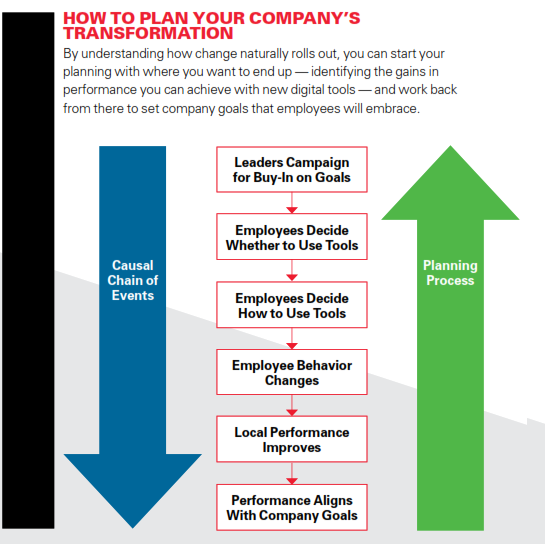Towards a “Digital Mindset” at Beever & Struthers
In this blog post, we focus on the transformational journey of Beever and Struthers’ audit function through the Knowledge Transfer Partnership (KTP). The objective is to showcase how adopting a socio-technical, democratic, and participative approach is planned to facilitate this transformation. The innovative application of these principles in a small firm setting addresses specific challenges, making our approach both unique and impactful.
The Philosophy of the Beever and Struthers KTP
The KTP at Beever and Struthers has adopted the underpinning socio technical, democratic and participative approach described in Paul Leonardi and Tsedal Neeley’s book “The Digital Mindset”.
This book is focussed on contemporary technologies, but the philosophy of socio technical information systems development can be traced back to the work of the Tavistock Institute and the democratic participative principes are embedded into the Scandinavian approach.
Manchester Business School’s Professor Enid Mumford was an early contributor to the practical application of socio technical systems development contained in the ETHICS methodology. Leonardi and Neeley take these ideas and package them into a modern methodology.
In our engaged scholarship we have applied the principles that give equal prominence to two main areas:
Technical Systems: These include the hardware, software, databases, and networks that make up the information system. The focus is on the technical specifications, performance, reliability, and security of the system.
Social Systems: These involve the people, organizational structures, policies, culture, and processes within which the information system will operate. The focus is on human interactions, work practices, roles, responsibilities, and social dynamics.
What We Aim to Achieve
Since the KTP began in August 2023, our focus has been on preparing for the digital transformation of our audit function. Here are some key areas we are addressing:
Enhanced Technology Integration: We are working with our technology vendors such as Inflo, Circit, Datasnipper etc to improve the compatibility and functionality of our audit processes. This involves creatively combining resources to address gaps and limitations.
Community Engagement: Through regular feedback loops and testing, we aim to foster a community of practice within Beever and Struthers. This participative approach encourages curiosity and engagement among our teams, making them active contributors to the transformation process.
The Role of Bricolage in Our Transformation Journey
One of the key concepts we are utilizing in our digital transformation is bricolage—making do with available resources and combining them in innovative ways. This approach is particularly relevant for small and medium-sized firms like ours, which often face resource constraints.
Key Elements of Bricolage in Our Digital Transformation Efforts:
Making Do with Resources at Hand: We plan to use existing software and tools creatively to meet our needs, even if they are not perfectly suited to our requirements.
Combining Resources: By integrating multiple software solutions, we aim to create a cohesive and efficient system that addresses our specific needs.
Adapting to Constraints: We recognize that we may not have the same resources as larger firms, but we believe that our innovative approach can help us achieve similar results.
Integrating Socio-Technical Principles: A Closer Look
A useful summary of Leonardi and Neeley’s book, which underpins our KTP, can be found in their article on Developing a Digital Mindset. This resource illustrates the socio-technical, democratic participation in action with various examples. Leonardi and Neeley express a socio technical understanding when considering the planning of digital transformation :
Here the authors focus on a digital transformation process that emphasizes “buy in” and “employees deciding to use the tools”. This is a major shift away from a tech centric view of digital transformation that imposes the technology on people. We plan to actively apply these principles at Beever and Struthers, expecting that they will prove effective in engaging our employees and fostering a thriving community of practice.
Inflo Pilots and Roll Out: Adhering to Socio-Technical Principles
Our socio technical approach at Beever Struthers has been achieved by shortlisting a suitable audit platform “Inflo” which will be trialled by auditors in a series of pilots. It’s crucial to continuously remind ourselves and Beever and Struthers of the Leonardi principles rooted in socio-technical design. There is always a risk of reverting to a technology-centric mindset, which can lead to imposing technology in a detached manner without considering the social and political context.
Maintaining a balance between technology and the human elements of the organization ensures that the technology is not only integrated but is also embraced by the users, leading to a more sustainable transformation.
As Leonardi and Neeley emphasize:
"Emphasizing the role of communities of practice in driving digital transformation is crucial. Continuous feedback loops help adapt and refine the technology based on user input, while democratic participation in decision-making processes ensures buy-in and engagement from all stakeholders."
The pilots will be evaluated following the comprehensive consideration of multiple criteria including job satisfaction. Only then through the participation of staff will the decision be made to roll out.
Conclusion
Our journey towards a “Digital Mindset” at Beever and Struthers represents socio technical design of IS and is embedded with a democratic ethos of participation. By maintaining a focus on community participation and feedback, we are preparing to transform the audit function into a more efficient and adaptive system that meets our organizational needs.

